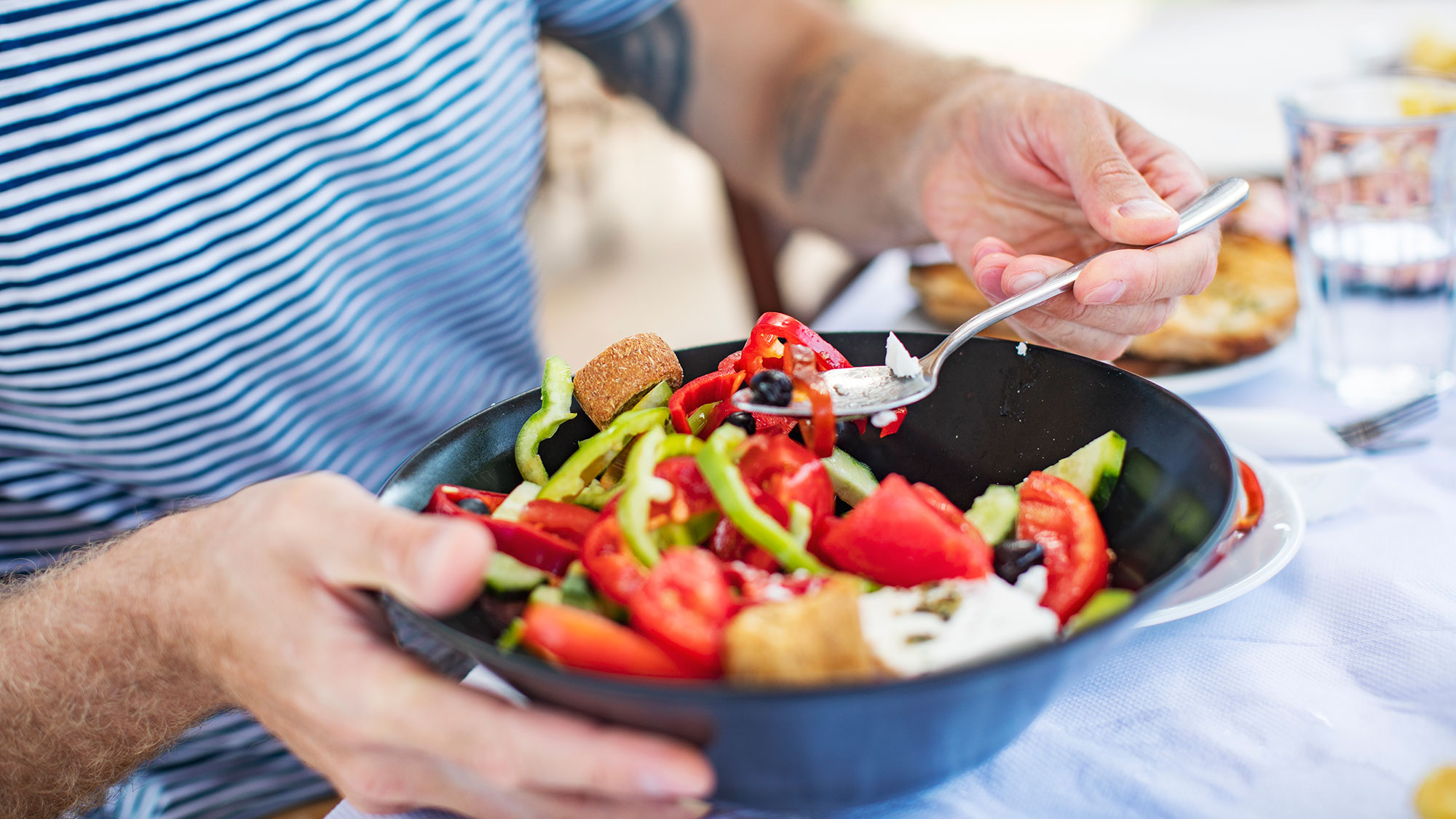Quercetin: the powerful antioxidant you've (probably) never heard of
Quercetin has been found to be a more potent antioxidant at fighting free radicals than even vitamin C


You're no doubt familiar with getting enough vitamin C and leafy greens in your daily diet - but are you similarly familiar with the benefits of quercetin?
This flavonoid (plant chemicals that help give fruit and vegetables their vivid colors) has emerged as a powerful antioxidant, with one study even suggesting it is more effective than the like of vitamin C in fighting free radicals.
If you're reading this wondering 'just what is quercetin' - and how you can get more of it in your diet - then read on to discover all you need to know.
From a young age we’ve been regularly encouraged to eat our greens. From courgettes to cucumber, when it comes to eating healthily the benefits of green fruit and vegetables are widely acknowledged. In one study from the University of Otago, researchers found that those who ate more fruits and vegetables over thirteen consecutive days reported greater flourishing in daily life, as assessed by reduced psychological distress and higher levels of well-being, curiosity, happiness, and creativity.
And it seems the greener the produce, the better. According to research from Michigan State University, darker green vegetables such as kale and spinach tend to be higher in iron and protein than their paler counterparts.
But while green fruit and veg tend to hog the nutritional limelight, there is a lot to be said for “eating the rainbow” - an expression designed to encourage the consumption of a variety of colorful fruits and vegetables.
According to research, the color of fruit and veg is a signpost for the specific nutrients it contains. These natural plant pigments - known as phytochemicals - play a powerful role in health and disease prevention.
Start your week with achievable workout ideas, health tips and wellbeing advice in your inbox.
For example, research shows that red-colored foods such as red bell peppers and tomatoes tend to have higher levels of antioxidants like vitamin C, making them effective for preventing inflammation and boosting the immune system. More recent research suggests that diets high in these colorful phytochemicals may help to offset the toxic effects of pollution.
One phytochemical that has caught the attention of researchers over the last decade is the flavonoid quercetin. This dietary component is proving to be something of a nutritional superstar, with science revealing its ability to function as an antioxidant inside the body. In fact, according to a study published in the International Journal of Medical Sciences, quercetin is a more potent antioxidant at fighting free radicals than even vitamin C, vitamin E, and beta-carotene.
Sources of quercetin
Unfortunately, humans cannot make their own quercetin, but research shows that many plant foods can provide you with this health-promoting compound. Good food sources of quercetin include:
- Yellow and green peppers
- Onions
- Shallots
- Cherries
- Tomatoes
- Apples
- Grapes
- Broccoli
- Kale
- All types of berries
It can also be found in green and black tea.
Certain studies suggest that some plant-based foods are superior to others in term of their quercetin bioavailability. For example, a study published in the Federation of European Biochemical Societies found that the quercetin from onions is more bioavailable than that from apples. The study also reported that eating quercetin alongside heart-healthy fats can improve absorption.
Interestingly, research shows that the amount of quercetin in foods may depend on the conditions in which the food was grown. In a study published in the Journal for Agricultural and Food Chemistry, organically grown tomatoes had 79 per cent more quercetin than conventionally grown.
If you’re not able to eat these foods every day, a supplement is the most consistent way to ensure you get an optimal daily dose of quercetin. In one study, researchers from the Boston University School of Medicine concluded that quercetin is a “safe, natural therapy that may be used as primary therapy or in conjunction with conventional methods”.
Studies, such as that published in the European Journal of Clinical Nutrition, show that typical dosages range from 500–1,000 mg per day. Research has also shown that quercetin absorption is increased when combining it with vitamin C or digestive enzymes like bromelain, which is found in papaya and pineapple.
However, it should be noted that quercetin is not a quick fix, it can take time to work. If using for an allergy, it won’t work like an antihistamine to nix symptoms fast. It is also worth being aware of that doses in excess of 1000mg per day have been shown to cause mild symptoms like stomach aches, headaches and tingling.
In an ideal world we would get all the nutrients we need from our diet, and whilst vitamins from food are always preferable to taking supplements, there are times when you may need to help boost your intake with a supplement. See our guide to the best vitamins for women over 50, to find the key supplements you should be taking.
Benefits of quercetin
Research has linked quercetin’s antioxidant properties to various potential health benefits. They include:
- Easing allergy symptoms
An exciting area of research indicates that quercetin could be an ally in the fight against allergies. Research has shown that in people with allergies, the increased levels of histamine often lead to itching, and sneezing symptoms. However, in test-tube studies, quercetin was shown to prevent the release of histamine from immune cells in the nose, lungs digestive tract and skin.
Plus, a recent 2020 study published in the journal Allergy, Asthma and Clinical Immunology, which reviewed the effect of quercetin on allergies, concluded that it would be a good candidate as a supplement for the management and treatment of allergic diseases, especially rhinitis.
- Anti-inflammatory benefits
For those suffering with inflammatory diseases such as arthritis, research shows that along with joint supplements to beat inflammation and arthritis pain, quercetin could also help. In an animal study published in the journal Pharmacognosy Review, researchers found that quercetin prevented both acute and chronic inflammation, in addition to showing anti-arthritis properties.
Research on healthy male athletes also found that quercetin could reduce inflammation. In the study published in the Journal of Research in Medical Sciences, the athletes were given the equivalent of 500 mg of quercetin for eight weeks. Following the supplementation, the athletes showed a reduction in oxidative stress and levels of inflammatory agents.
- Cancer fighting benefits
Studies show quercetin may suppress and even kill cancer cells in the prostate, liver, lung, breast, bladder, colon, blood and more. An in vitro study in the World Journal of Surgical Oncology found that quercetin showed promise in both the treatment and prevention of prostate cancer.
Another study in the journal Carcinogenesis looked at the relationship between quercetin intake and lung cancer risk in 38 non-tumour lung tissues and found that the higher the intake of quercetin, the lower the risk of lung cancer
- Lowering blood pressure
Research shows that quercetin may be a very powerful aid in reducing high blood pressure. In a test-tube study from the Journal of Pharmacology and Experimental Therapeutics, quercetin was shown to have a relaxing effect on blood vessels. In one animal study, supplementation with quercetin for 5 weeks reduced blood pressure values by around 20 per cent.
Additionally, a review of nine human studies, published in the Journal of the American Heart Association, found that that taking quercetin in supplement form daily reduced systolic and diastolic blood pressure.
- Preventing neurological diseases
Research, including that from the journal Oxidative Medicine and Cellular Longevity, suggests quercetin may protect against and even help combat Alzheimer's and dementia. In one study involving mice with Alzheimer’s disease, injections of quercetin were given every two days for three months. By the end of the study, the injections had reversed several markers of Alzheimer’s, and the mice showed an improved performance on their learning tests.
Another study, published in the Journal of Agriculture and Food Chemistry, suggested that human brain cells treated with quercetin had significantly less damage than those treated with vitamin C or not exposed to antioxidants at all.
A study published in the Neurobiology of Aging also found that when looking at the brain protective properties of coffee, the primary compound responsible for its potential Alzheimer-fighting effects was quercetin, not the caffeine as is often thought.
- Boosting exercise performance
Research shows that quercetin could be a useful aid to help you ramp up your runs. In a study published in the journal Medicine and Science in Sports and Exercise, researchers reviewed 11 human studies and found that taking quercetin may slightly improved the body’s ability to use oxygen during exercise as well as providing a boost to endurance exercise performance.
Angela has been a health writer for over 10 years, contributing to a range of online and print publications including Women's Health, Women's Fitness, Your Fitness, Top Santé, Healthy, and Good Housekeeping. She writes about all aspects of health and wellbeing, with a special interest in nutrition and the therapeutic application of food. A qualified nutritionist and a recipe developer, she is the founder of Dara Dara Nutrition and has developed recipes for titles including GoodtoKnow. In her spare-time she likes to throw netballs, hula hoops and yoga poses (or what poses as yoga!) and has recently taken to the bass guitar. Fortunately for her neighbors, she’s invested in some headphones.
